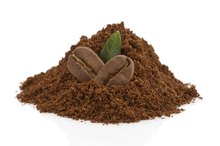What does fact checked mean?
At Healthfully, we strive to deliver objective content that is accurate and up-to-date. Our team periodically reviews articles in order to ensure content quality. The sources cited below consist of evidence from peer-reviewed journals, prominent medical organizations, academic associations, and government data.
The information contained on this site is for informational purposes only, and should not be used as a substitute for the advice of a professional health care provider. Please check with the appropriate physician regarding health questions and concerns. Although we strive to deliver accurate and up-to-date information, no guarantee to that effect is made.
Can Too Much Caffeine Cause Anger & Confusion?
Caffeine has its benefits: It reduces fatigue, stimulates your nervous system and helps you stay alert. However, consuming it in excess has drawbacks; if you drink too much caffeine, you may experience side effects like irritability, nervousness and even anger and confusion. Talk to your doctor about reducing your caffeine intake, and cut back if your consumption is causing you more harm than good.
Side Effects of Caffeine
Your body absorbs and distributes caffeine rapidly after you consume it, and it does not continually circulate in your bloodstream but is excreted through your urine, explains the University of Iowa Hospitals and Clinics 12. Caffeine provides temporary relief from drowsiness, but it also has some negative side effects. These include feelings of anxiety and restlessness, as well as irritability and anger. If these feelings get in the way of your ability to function and pay attention, you may then experience confusion as well. Too much caffeine can also cause a rapid heart rate, digestive upset and muscle tremors.
- Your body absorbs and distributes caffeine rapidly after you consume it, and it does not continually circulate in your bloodstream but is excreted through your urine, explains the University of Iowa Hospitals and Clinics 1.
- If these feelings get in the way of your ability to function and pay attention, you may then experience confusion as well.
How Much Is Too Much?
Does Excessive Caffeine Cause Potassium Depletion?
Learn More
A moderate dose of caffeine is defined as 200 to 300 milligrams a day, and this translates to 2 to 3 cups of coffee, according to MedlinePlus.com 2. For most people, this amount is unlikely to cause harm. Heavy consumption is defined as more than 500 to 600 milligrams a day, and it is this amount of intake that is most likely to cause anger, confusion and other adverse symptoms. But some people are more sensitive to caffeine and its effects than others. So even if your consumption is within the moderate range, you should still consider cutting back if you are experiencing negative effects.
- A moderate dose of caffeine is defined as 200 to 300 milligrams a day, and this translates to 2 to 3 cups of coffee, according to MedlinePlus.com 2.
- Heavy consumption is defined as more than 500 to 600 milligrams a day, and it is this amount of intake that is most likely to cause anger, confusion and other adverse symptoms.
Caffeine Content and Ways to Reduce
Caffeine may be in more items than you think -- coffee, caffeinated tea, chocolate, cocoa and some sodas all contain caffeine. Certain pain relievers, cold medicines and appetite suppressants may also contain caffeine. If you need to cut back on your caffeine intake, do this over the course of several days or weeks. For example, try lessening your intake of coffee by 1 cup each day, or less if you find you are experiencing withdrawal symptoms. Reducing your intake too quickly can cause negative effects as well, which may make you feel even angrier and more confused than when you consumed caffeine.
- Caffeine may be in more items than you think -- coffee, caffeinated tea, chocolate, cocoa and some sodas all contain caffeine.
Additional Considerations
Caffeine & Heart Palpitations
Learn More
Keep in mind that certain medications, such as antibiotics, as well as herbal supplements like echinacea can increase caffeine’s concentration in your blood, resulting in heightened negative side effects like anger and confusion. Never stop taking your medications or otherwise altering your diet without first discussing these changes with your health-care provider. People with coronary heart disease or peptic ulcers may have to limit or eliminate their caffeine intake to avoid potential health complications, according to Drugs.com 3.
Related Articles
References
- University of Iowa Hospitals and Clinics: Caffeine -- How Much Is Too Much?
- MedlinePlus: Caffeine in the Diet
- Drugs.com: Caffeine Disease Interactions
- Meredith SE, Juliano LM, Hughes JR, Griffiths RR. Caffeine Use Disorder: A Comprehensive Review and Research Agenda. J Caffeine Res. 2013;3(3):114-130. doi:10.1089/jcr.2013.0016
- Richards G, Smith AP. A Review of Energy Drinks and Mental Health, with a Focus on Stress, Anxiety, and Depression. J Caffeine Res. 2016;6(2):49-63. doi:10.1089/jcr.2015.0033
- Brunyé TT, Mahoney CR, Rapp DN, Ditman T, Taylor HA. Caffeine enhances real-world language processing: evidence from a proofreading task. J Exp Psychol Appl. 2012;18(1):95-108. doi:10.1037/a0025851
- Koppelstaetter F, Poeppel TD, Siedentopf CM, et al. Caffeine and cognition in functional magnetic resonance imaging. J Alzheimers Dis. 2010;20 Suppl 1:S71-84. doi:10.3233/JAD-2010-1417
- Harrell PT, Juliano LM. Caffeine expectancies influence the subjective and behavioral effects of caffeine. Psychopharmacology (Berl). 2009;207(2):335-42. doi:10.1007/s00213-009-1658-5
- Lucas M, O'reilly EJ, Pan A, et al. Coffee, caffeine, and risk of completed suicide: results from three prospective cohorts of American adults. World J Biol Psychiatry. 2014;15(5):377-86. doi:10.3109/15622975.2013.795243
- Abdel-Hady H, Nasef N, Shabaan AE, Nour I. Caffeine therapy in preterm infants. World J Clin Pediatr. 2015;4(4):81-93. doi:10.5409/wjcp.v4.i4.81
- American Psychiatric Association. Diagnostic and Statistical Manual of Mental Disorders. 5th edition. Washington DC; 2013.
- Turnbull D, Rodricks JV, Mariano GF, Chowdhury F. Caffeine and cardiovascular health. Regul Toxicol Pharmacol. 2017;89:165-185. doi:10.1016/j.yrtph.2017.07.025
- Centers for Disease Control and Prevention. Alcohol and Caffeine. Updated October 23, 2018.
- Alsunni AA. Energy Drink Consumption: Beneficial and Adverse Health Effects. Int J Health Sci (Qassim). 2015;9(4):468-474.
- Lyngsø J, Ramlau-Hansen CH, Bay B, Ingerslev HJ, Hulman A, Kesmodel US. Association between coffee or caffeine consumption and fecundity and fertility: a systematic review and dose-response meta-analysis. Clin Epidemiol. 2017;9:699-719. doi:10.2147/CLEP.S146496
- U.S. Food and Drug Administration. Pure and Highly Concentrated Caffeine. Updated September 21, 2018.
- National Institute on Drug Abuse. Drugs, Brains, and Behavior: The Science of Addiction. Updated July 2018.
Writer Bio
Lynne Sheldon has over 12 years of dance experience, both in studios and performance groups. She is an avid runner and has studied several types of yoga. Sheldon now works as a freelance writer, editor and book reviewer. She holds a Bachelor of Arts in English and art history from Boston University and recently completed her Master of Fine Arts in writing from Pacific University.









